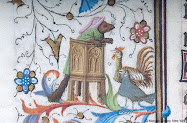It’s Wednesday, so it must be French night. I’ve been doing lessons with the same core group of people for a couple of years now, and we’ve fine-tuned our rota for bringing the wine each week. Tonight, we were pondering the finer points of the conditionnel passé and I admit it, a glass of chardonnay down and my mind was drifting a bit. I was thinking about how when you learn a foreign language, you start to realise how much words really do construct realities and even set limits on the tangible world.
A case in point: In French, the word for ‘wife’ and ‘woman’ is the same – la femme. When you’re listening to someone talk, you have to pay close attention to context to tell which noun is intended and even then it may not be clear. It’s almost as though you can’t be a woman unless you’re a wife. I’m guessing the word itself is the product of a long history in which this was the case, with women only being defined in terms of their relationship to a man. One went from being une fille (both ‘daughter’ and ‘girl’) to being une femme. For men, the case is different. You can be un mari (husband) as well as un homme (man), or you can be the latter while not being the former.
When this difference is embedded deep in the substratum of a society, through its shared language, I can see how it becomes very difficult for women to sever the bonds that have named and defined them exclusively in terms of their relationships to men. I also suspect that the overtly gendered nature of the French language (every noun is either masculine or feminine, le or la) helps produce and reproduce what is a noticeably more gendered society. Sure, this is quite a generalisation and it’s based purely on my own limited observations, but I reckon I’m onto something. What do you think?
I’m fascinated by linguistics, semiotics and post-structural/ deconstructionist theories of language and it doesn’t surprise me that some of the biggest names in these fields were native French speakers – viz. Roland Barthes, Jacques Derrida and Michel Foucault for starters. It’s all hugely complex and intriguing, and I'm loving learning much more about it as my studies in history advance and I become immersed in theory. The freaky thing, though, is that it has completely changed the way I look at the world around me. So many things I used to simply take for granted, I am now picking apart, inverting, subverting and rejecting. What about you? Have you had any of those 'a ha' moments where the theory suddenly starts making sense in the real world and patterns become visible that you never noticed before? Share, s'il vous plait.
Wednesday, May 13, 2009
Subscribe to:
Post Comments (Atom)




No comments:
Post a Comment